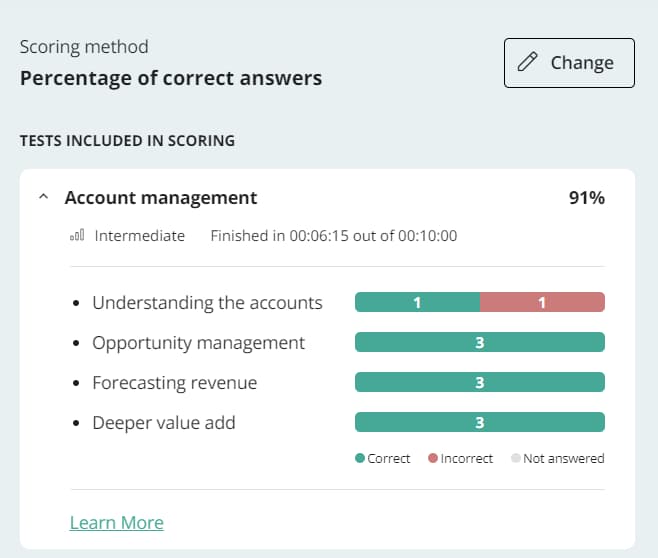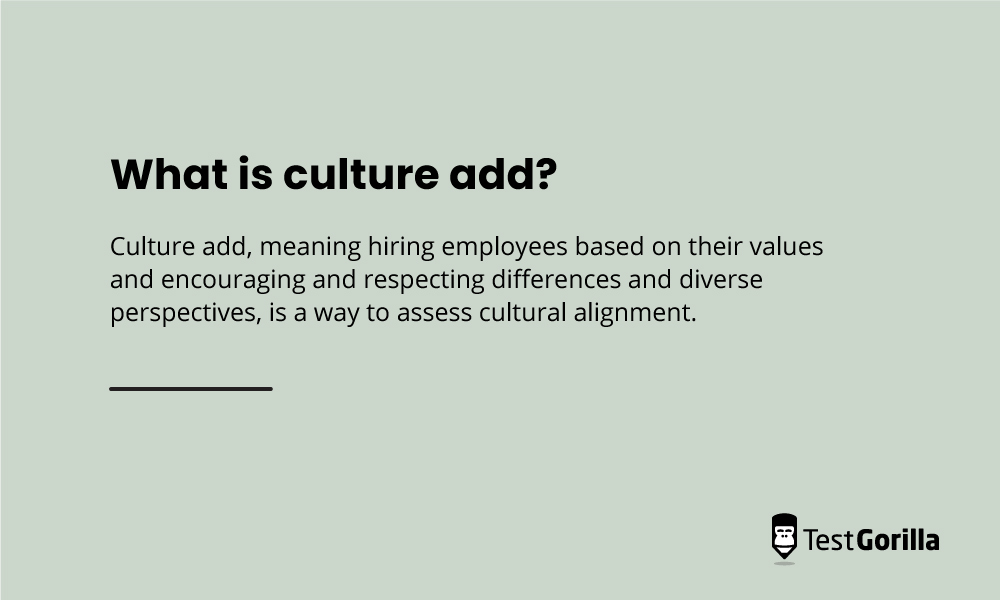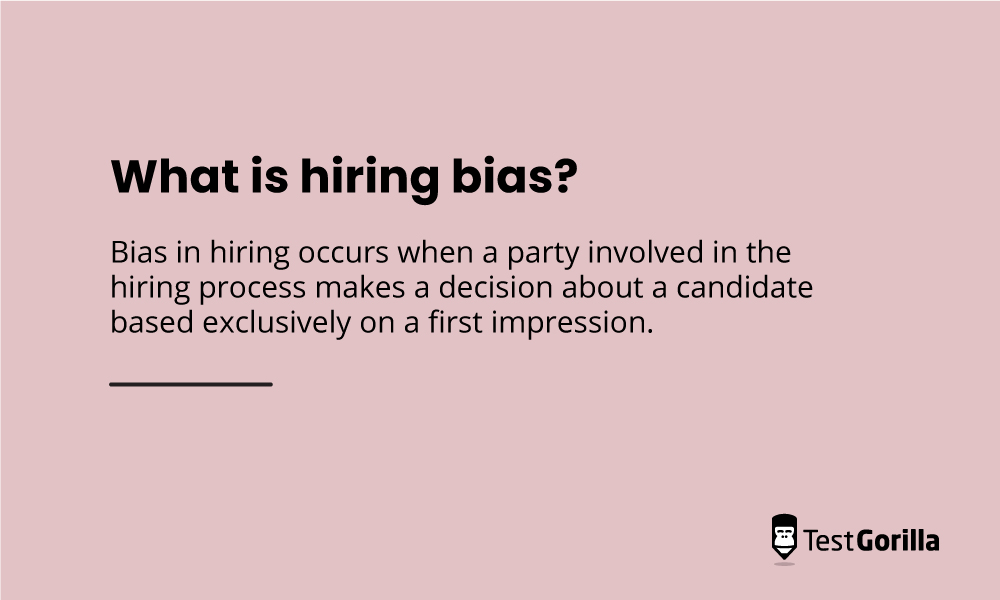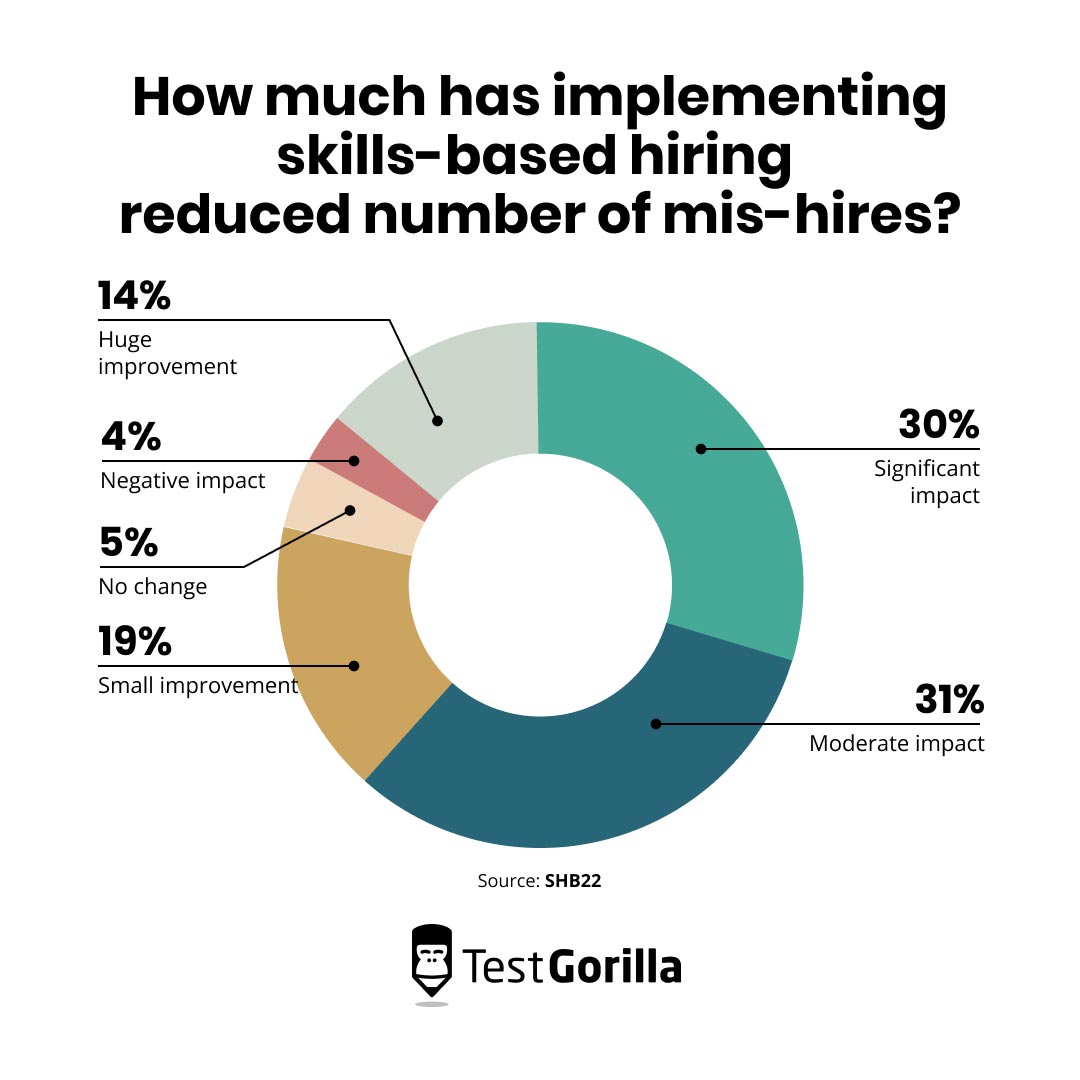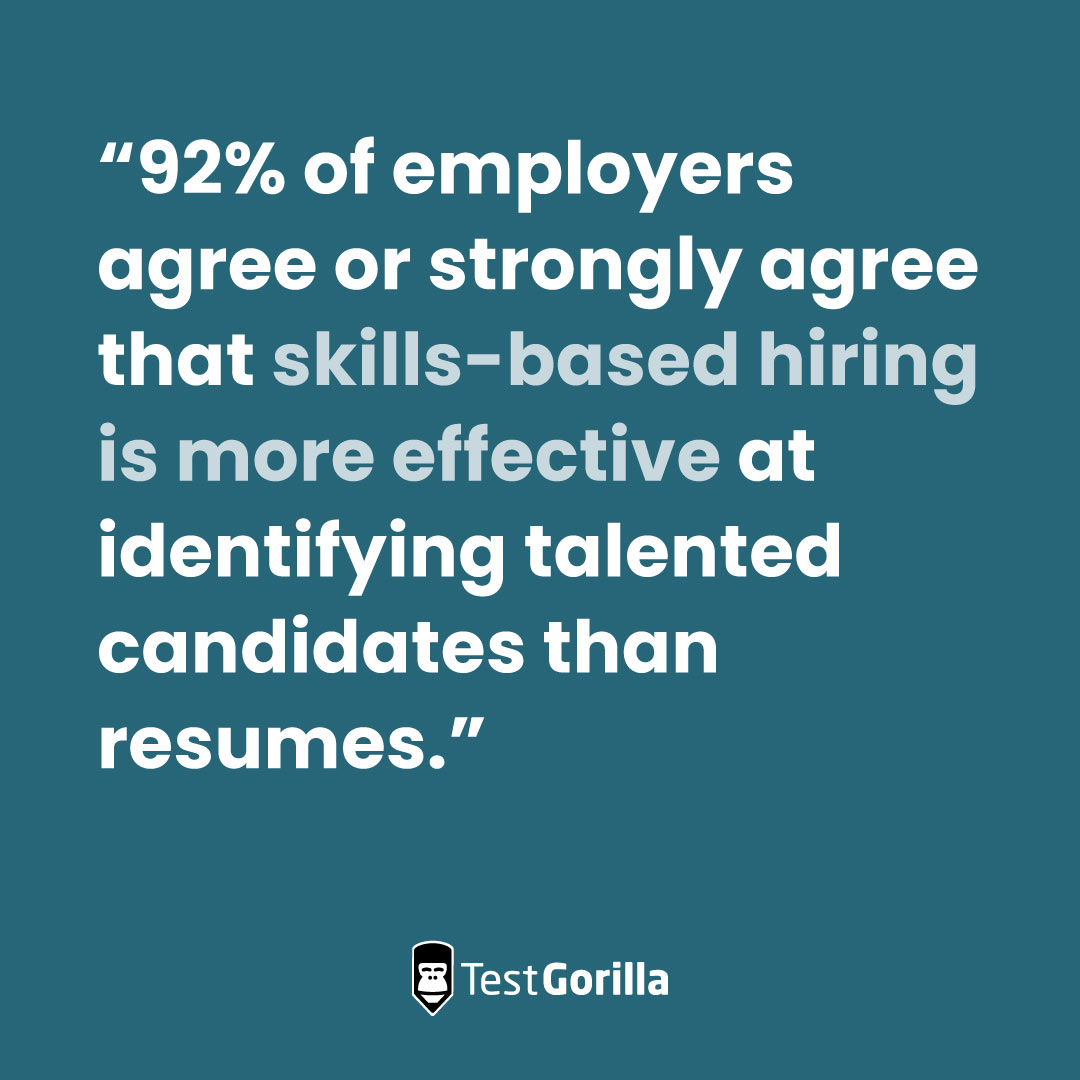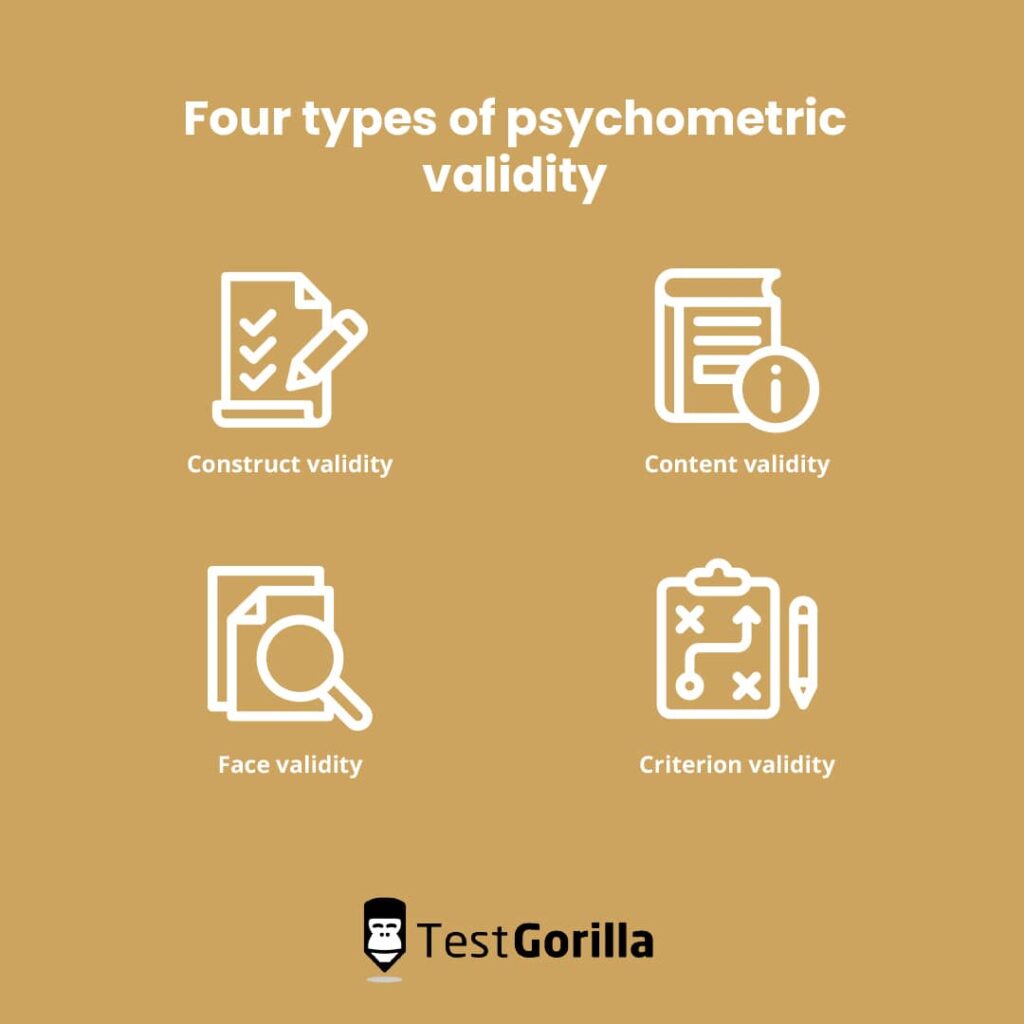Traditional, resume-based hiring marginalizes diverse candidates and makes them vulnerable to unconscious bias. By using scientifically validated skills tests, companies can make sound decisions about who to interview and hire using data that isn’t open to bias. This is the premise of skills-based hiring.
Skills-based hiring is more than a buzzword: it's a hiring trend that's here to stay. In that spirit, here's a glossary of hiring terms for recruiters that goes beyond recruitment buzzwords.
Note: the definitions in this glossary demonstrate how we understand the terms at TestGorilla, in relation to skills-based hiring. They might be used differently in other organizations and contexts.
Table of contents
What are recruitment buzzwords?
Buzzword: (n). A word or a phrase that is trendy in a specific time or context. Buzzwords are often used superficially, in order to impress people. Usage of buzzwords doesn't typically last, they are just fashionable for a while.
Recruitment buzzwords are trending recruitment terms that might be relevant now but probably won't be for very long. Some good examples of recruitment buzzwords are 'quiet quitting', 'loud quitting', and 'rage quitting'.
Why is skills-based hiring not a buzzword?
Buzzwords are characterized by transience. They are quickly pushed into and then out of relevance by media and marketplace trends.
Skills-based hiring isn't a recruitment buzzword because it's not going to become irrelevant any time soon. It's a hiring trend that's well and truly here to stay. How do we know this? Data from our 2023 State of Skills-Based Hiring report tells us that:
73% of employers have already adopted skills-based hiring
Over 70% of employers consider skills-based hiring to be a more effective hiring tool than resumes
60% of employers expect their budget for skills-based hiring to increase over the next 12 months
58% of employers say they will use skills-based hiring more than they did in the last 12 months
42% of employees want to see the adoption of skills-based hiring methods increase in the next 12 months
The State of Skills-Based Hiring 2024
Read TestGorilla's annual report to discover why over 81% of companies are choosing to adopt skills-based hiring methods in 2024.
An A-Z glossary of terms for skills-based hiring
Below you'll find a comprehensive glossary to help you understand some of the terminology around skills-based hiring. Since it is also a science-backed hiring process, you can head to our science glossary for definitions of the more scientific terms.
Accommodations
Special adjustments that are made for a person or group with different needs than most, e.g. providing an interpreter when interviewing a deaf candidate.
Application process
The process of applying for a job. Starts with a job application submission and covers everything that is required up until the point of accepting or rejecting a candidate.
Assessment
Assessing something in order to make a judgment. A TestGorilla assessment is the totality of 2 to 5 tests plus any custom questions chosen by a recruiter to test their candidates’ suitability for a job role.
Benchmark/scoring method
A tool that recruiters can use to see how their candidates scored on a TestGorilla test compared to other candidates who have taken the same test for different recruiters. One example of a scoring method is to use the percentage of correct answers.
Candidate pipeline
A group or database of partially vetted prospective candidates that exists prior to a job opening, accompanied by a systematic process to take them from sourced to hired. Also known as a talent or recruitment pipeline.
Cognitive ability
General mental capabilities that involve planning, problem-solving, reasoning, and thinking abstractly to process and manipulate information and complete simple and complex tasks.
Culture add
Refers to the likelihood that a candidate will bring different perspectives and attitudes to a company that contributes positively to its existing culture.
Custom questions
Questions specific to a company and/or job role designed by employers. With TestGorilla, these can be in multiple choice, essay, video, file upload, or code format.
Diversity
The practice of including people from a range of groups with different shared characteristics, such as age, class, disability, gender, race, and sexuality.
Diversity, equity, and inclusion (DE&I)
Policies, particularly in the workplace, that encourage the representation and participation of groups with different shared characteristics, experiences, and abilities.
Employment law
A set of laws that regulates the relationship between employers and employees, including employees’ rights and employers’ responsibilities. For more on employment law, read our blog about skills-based hiring and legal defensibility.
Hiring bias
Discrimination that occurs (often unconsciously) during employers’ recruitment processes, on the basis of characteristics including age, class, disability, gender, race, and sexuality. Also known as recruitment bias.
Hiring strategy
A recruiter’s approach to choosing candidates who can best support the organization’s goals.
Inclusion
The practice of providing equal access to resources and opportunities for groups that might otherwise be marginalized.
Meritocracy
An organization or society where people are selected for roles or positions of power based on their skills and abilities, rather than factors such as educational background or class.
Mis-hire
The act of hiring someone who is not a good fit for the job or the company. Employers are reducing mis-hires with skills-based hiring.
Personality test
A series of questions designed to identify how one perceives the world and align these perceptions with various widely accepted personality types.
Pre-employment testing
Standardized pre-employment testing is designed to aid in recruitment with the purpose of ascertaining whether a candidate has the necessary competencies needed to perform a specific job.
Proficiency
Having a high level of skill or expertise; for example, language proficiency.
Profiling
The act of suspecting or targeting an individual on the basis of observed characteristics rather than evidence.
Qualifying questions
Questions that will determine whether a candidate meets the minimum requirements for a role.
Question bank
A collection of questions that are stored and shuffled for later, and sometimes repeated, use. Each TestGorilla test has a question bank with a minimum of 100 questions.
Recruitment strategy
A formalized plan that covers roles to hire for, processes for finding, engaging, and evaluating candidates, and onboarding new hires.
Reliability
A measure of how consistently a test returns the same results given the same inputs. At TestGorilla we use reliability to measure the consistency of our tests.
Skill area
A subject area within which someone can work to achieve a level of ability, knowledge, experience, and expertise.
Skills-based hiring
The practice of hiring based on skills and performance rather than on formal qualifications such as a degree or work experience.
SOC2 compliance
An auditing procedure based on guidelines set by the Auditing Standards Board of the American Institute of Certified Public Accountants (AICPA). It is used to assess the security, availability, processing integrity, confidentiality, and privacy of information systems.
Structured interviews
An interview method in which the same questions are asked in a set order to all candidates. This approach ensures that responses can be compared and evaluated reliably.
Subject matter expert
A person who can provide deep knowledge of and expertise in a specific subject.
Talent pool
A database of viable candidates who have shown interest in or demonstrated the required skills to fill open positions within your organization.
Test
A series of questions, tasks, and problems used to evaluate a person’s skills in a particular subject area. A TestGorilla test covers one skill and usually lasts 10 minutes.
Unstructured interviews
A flexible type of interview with no fixed pattern or set of questions. Instead, the interviewer adapts their questions based on the participant’s previous answers.
Validity
The quality of being reasonable, correct, or accepted. At TestGorilla we use validity to evaluate how accurately a test measures what it is intended to measure. There are lots of different types of validity: for example, the four types of psychometric validity are content validity, construct validity, criterion validity, and face validity.
Download a free PDF of this glossary
If this glossary is useful to you, you can download a PDF version for free using this link.
Go beyond recruitment buzzwords with TestGorilla
If you're just getting started with skills-based hiring, we'd recommend reading these 10 best practices in hiring for skills. If you're not yet doing skills-based hiring but you'd like to start, book a demo with our team or sign up for a free plan to see for yourself what it's all about.
Related posts
Hire the best candidates with TestGorilla
Create pre-employment assessments in minutes to screen candidates, save time, and hire the best talent.
Latest posts
The best advice in pre-employment testing, in your inbox.
No spam. Unsubscribe at any time.

Hire the best. No bias. No stress.
Our screening tests identify the best candidates and make your hiring decisions faster, easier, and bias-free.
Free resources
This checklist covers key features you should look for when choosing a skills testing platform
This resource will help you develop an onboarding checklist for new hires.
How to assess your candidates' attention to detail.
Learn how to get human resources certified through HRCI or SHRM.
Learn how you can improve the level of talent at your company.
Learn how CapitalT reduced hiring bias with online skills assessments.
Learn how to make the resume process more efficient and more effective.
Improve your hiring strategy with these 7 critical recruitment metrics.
Learn how Sukhi decreased time spent reviewing resumes by 83%!
Hire more efficiently with these hacks that 99% of recruiters aren't using.
Make a business case for diversity and inclusion initiatives with this data.


